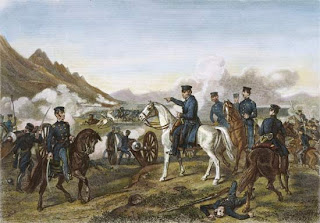World War I

World War I was the result of leaders' aggression towards other countries which was supported by the rising nationalism of the European nations. Economic and imperial competition and fear of war prompted military alliances and an arms race, which further escalated the tension contributing to the outbreak of war.
At the settlement of the Congress of Vienna in 1815, the principle of nationalism was ignored in favor of preserving the peace. Germany and Italy were left as divided states, but strong nationalist movements and revolutions led to the unification of Italy in 1861 and that of Germany in 1871. Another result of the Franco-Prussian War of 1870-71 was that France was left seething over the loss of Alsace-Lorraine to Germany, and Revanche was a major goal of the French. Nationalism posed a problem for Austria-Hungary and the Balkans, areas comprised of many conflicting national groups. The ardent Panslavism of Serbia and Russia's willingness to support its Slavic brother conflicted with Austria-Hungary's Pan-Germanism.
Another factor which contributed to the increase in rivalry in Europe was imperialism. Great Britain, Germany and France needed foreign markets after the increase in manufacturing caused by the Industrial Revolution. These countries competed for economic expansion in Africa. Although Britain and France resolved their differences in Africa, several crises foreshadowing the war involved the clash of Germany against Britain and France in North Africa. In the Middle East, the crumbling Ottoman Empire was alluring to Austria-Hungary, the Balkans and Russia.
The menace of the hostile division led to an arms race, another cause of World War I. Acknowledging that Germany was the leader in military organization and efficiency, the great powers of Europe copied the universal conscription, large reserves and detailed planning of the Prussian system. Technological and organizational developments led to the formation of general staffs with precise plans for mobilization and attack that often could not be reversed once they were begun. The German Plan to attack France before Russia in the event of war with Russia was one such complicated plan that drew more countries into war than necessary.
http://encarta.msn.com/encyclopedia_761569981/World_War_I.html
At the settlement of the Congress of Vienna in 1815, the principle of nationalism was ignored in favor of preserving the peace. Germany and Italy were left as divided states, but strong nationalist movements and revolutions led to the unification of Italy in 1861 and that of Germany in 1871. Another result of the Franco-Prussian War of 1870-71 was that France was left seething over the loss of Alsace-Lorraine to Germany, and Revanche was a major goal of the French. Nationalism posed a problem for Austria-Hungary and the Balkans, areas comprised of many conflicting national groups. The ardent Panslavism of Serbia and Russia's willingness to support its Slavic brother conflicted with Austria-Hungary's Pan-Germanism.
Another factor which contributed to the increase in rivalry in Europe was imperialism. Great Britain, Germany and France needed foreign markets after the increase in manufacturing caused by the Industrial Revolution. These countries competed for economic expansion in Africa. Although Britain and France resolved their differences in Africa, several crises foreshadowing the war involved the clash of Germany against Britain and France in North Africa. In the Middle East, the crumbling Ottoman Empire was alluring to Austria-Hungary, the Balkans and Russia.
The menace of the hostile division led to an arms race, another cause of World War I. Acknowledging that Germany was the leader in military organization and efficiency, the great powers of Europe copied the universal conscription, large reserves and detailed planning of the Prussian system. Technological and organizational developments led to the formation of general staffs with precise plans for mobilization and attack that often could not be reversed once they were begun. The German Plan to attack France before Russia in the event of war with Russia was one such complicated plan that drew more countries into war than necessary.
http://encarta.msn.com/encyclopedia_761569981/World_War_I.html





